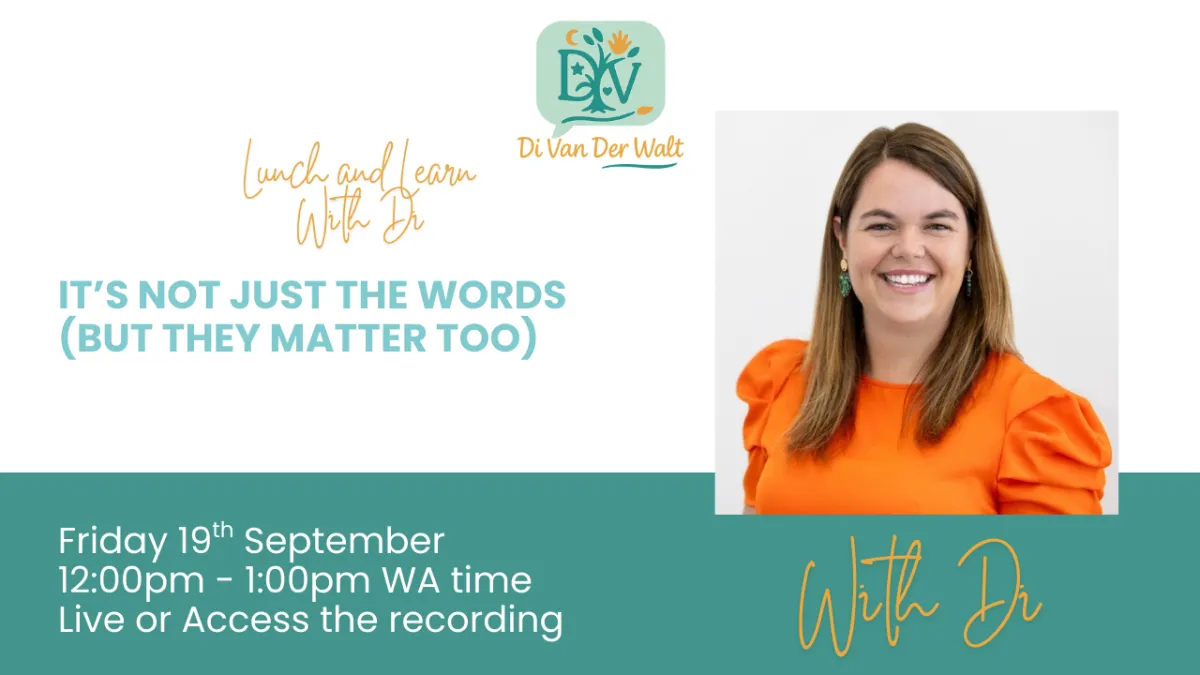
It’s Not Just the Words, But They Matter Too
It’s Not Just the Words, But They Matter Too
How shifting our language shifts the whole therapy experience
There’s a moment I still think about often.
A parent gently asked me if I could stop referring to their child as “non-verbal.”
“She has so much to say,” they said, “just not with speech.”
That conversation cracked something open in me. And maybe, just maybe, it’ll do the same for you too.
Language Isn’t Just Words. It’s Relationship.
We use words all day long as therapists — in sessions, in emails, in documentation. They shape how we connect, how we advocate, how we affirm.
But too often, we inherit language from systems that weren’t designed to honour difference. Words like “non-compliant,” “refuses,” “poor social skills.” Phrases that subtly or not-so-subtly cast the child as the problem — and us as the fixer.
And yet, when we really slow down — when we listen, breathe, and reflect — we realise something powerful:
The words we choose can make a space safer, softer, or sharper.
The way we describe a child can shape how that child sees themselves.
The tone of our reports can either build trust or break it.
It Starts With Awareness, Not Perfection
Let’s take a moment here. A breath.
This isn’t about being politically correct. It’s about being relationally accurate. About aligning the words we use with the values we say we hold.
So before we talk about changing language, let’s normalise the discomfort. Because I’ve been there too. I’ve written deficit-based reports because “that’s how we get funding.” I’ve used terms I no longer stand by. I’ve had to unlearn, rewrite, and reword — often sentence by sentence.
If you’re feeling a bit exposed right now, please know: this is not about shame. It’s about growth. And you don’t have to get it perfect — you just have to stay curious.
Why Words Matter: The Evidence is Clear
This shift toward affirming language isn’t just a nice-to-have. It’s becoming a professional standard.
The Psychology Board of Australia is introducing neurodiversity-affirming competencies, including inclusive language use.
Speech Pathology Australia’s 2024 Terminology Report recommends replacing older labels with strengths-based, respectful alternatives.
A 2022 study in Sage Journals found that using affirming language strengthens therapeutic alliances — across disciplines.
This isn’t just ethics. It’s good clinical care.
From Default to Intentional: What to Say Instead
We all have language we fall back on — especially when we’re tired, stressed, or rushing.
That’s why I encourage therapists I mentor to notice their “default phrases.”
Ask yourself:
Under stress, I often say...
What that tells me is...
One word I want to try instead is...
To help, here are a few real-life reframes we’ve used in our practice:
Instead ofTryNon-compliantCommunicating boundariesRefuses to participateNeeded more safety or predictabilityLow functioningHas high support needsPoor eye contactUses alternative ways to connectStruggles with transitionsBenefits from predictability and gentle routines
You’ll notice it’s not just softer — it’s more accurate. More respectful. And more aligned with how children actually show up in the world.
The Affirming Language Bot: A New Little Helper
Let’s be real — rewriting every report, note, or goal overnight can feel overwhelming.
So I created a little assistant to help.
The Affirming Language Bot is a free tool designed to support allied health professionals in using neurodiversity-affirming language across their documentation. You can use it to:
Rewrite progress notes into affirming summaries
Reword goals with strengths-based language
Transform clinical phrases into parent-friendly language
Draft respectful, empowering report sections
Even generate affirming feedback or scripts
Important reminder: Please don’t enter any identifying client details. This tool is for educational and administrative use only. Always use your clinical judgment and review everything before you hit send.
Get access to the Affirming Language Bot HERE
Foundations, Connections, Transformations, Reflections
In my Zone framework, we explore our practice through four powerful lenses:
Foundations – What are the values and beliefs underpinning our work
Connections – How do we relate with families, children, and ourselves
Transformations – What shifts are we making in real-life practice
Reflections – What do we notice about our defaults and our growth
This language work lives in all four zones.
You can’t reflect without looking at language.
You can’t transform without practicing new ways of speaking.
You can’t connect deeply if your words create disconnection.
And you can’t build strong foundations without aligning your language with your values.

Start Small. Celebrate Often.
You don’t have to change everything today. Just notice something new.
Create a shared reword bank with your team
Practice scripting your report like the parent is sitting next to you
Use the affirming language bot to test out new phrasing
Ask families directly: “Are there any words that feel more respectful to you?”
Because small changes add up.
Let’s Reflect Together
As we wrap up, I’d love to invite you into a moment of reflection:
What’s one phrase you’re now rethinking
What shifted for you as we explored affirming language
How could your language reflect your values more clearly
You can share with me via email, messenger, or in the Therapist Zone Facebook group (link is in the course portal if you're a member).
We’re not here to be perfect. We’re here to grow — together.
With warmth and belief in your practice,
Di
